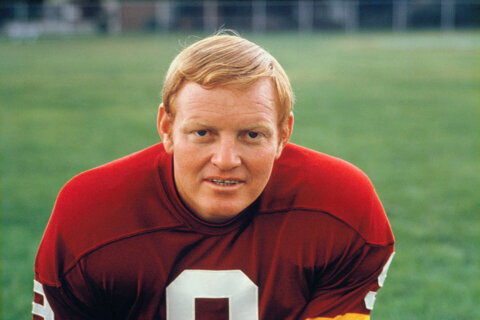WASHINGTON — I always hated Barry Bonds.
Growing up across the San Francisco Bay as an Oakland A’s fan, I felt about Bonds probably the same way most Orioles fans feel about Bryce Harper. He was the big slugger for our natural rival. He was also a notorious jerk. If that wasn’t enough, my uncle was the agent for Jeff Kent, with whom Bonds very publicly spatted.
I just wanted to get all that on the table. Because with Giancarlo Stanton nearing the 60 home run mark, it has come to my attention once again that large swaths of baseball fans do not think that Bonds’ single-season home run record of 73, set in 2001, is the actual home run record. So let’s just be clear: Barry Bonds hit 73 home runs in 2001. That is the most ever hit in a single season. That is the single-season home run record, full stop.
You can question for yourself the legitimacy of the accomplishment, but it doesn’t change the fact that what happened actually happened. There is no rewriting history. Pretending that Barry Bonds didn’t actually hit 73 home runs in 2001 may make you feel better about the purity of the game’s records, but it doesn’t change the fact that it actually happened.
If you say Bonds’ record doesn’t count because you’re sure he used steroids (which you can’t be, even if he probably did), do you then throw out Mark McGwire’s mark of 70 from 1998, after admitting his own steroid use? What about Sammy Sosa’s 66 from that year, after it was later revealed he tested positive for steroids in 2003? McGwire’s 65 from 1999? Sosa’s 64 or 63 from the same era? Does your suspicion and moral judgment of Bonds override the facts of what actually happened?
Major League Baseball didn’t test for steroids until 2003 or begin to implement penalties for performance-enhancing drugs until 2004. And even then, the claims that steroids actually help players hit home runs are, at best, inconclusive. Former MLB player and current Nationals television play-by-play man F.P. Santangelo is an admitted humane growth hormone user named in the infamous Mitchell Report. His career high in home runs? Seven, in 1996.
Hank Aaron, among many others, has admitted using greenies, or amphetamines, during his playing career. It was simply a part of the game. Does that make Aaron’s 755 career home run mark illegitimate?
If you’re one of the old Babe Ruth apologists who insists that even Maris’s record of 61 still deserves an asterisk because it was achieved in 162 games rather than 154, then Bonds is still the home run king. He swatted his 68th dinger in the Giants’ 154th game of 2001. Of course, any talk of Ruth cannot be had without mentioning that he never had to face a then-20-year-old Satchel Paige in 1927 — who struck out 63 batters in 49.1 Negro League innings, a rate of 11.5 per nine, nearly double the Major League leader that year (Dazzy Vance, 6.1 K/9 IP) — nor any other player of color.
This year, studies have shown that the baseball itself is juiced, as smaller balls with flatter seams travel further off the bat. The full-season league home run record was shattered with two full weeks left to play, fittingly by Alex Gordon. Gordon has been, by the offensive wins above replacement measure, one of the very worst hitters in all of baseball this year, but has still swatted eight homers.
The truth is that baseball continues to evolve and adapt as teams have realized the immense value of home runs and have shifted philosophies to emphasize trying to hit them. As The Washington Post’s Neil Greenberg displayed in June, baseball is seeing the highest rate of hits leaving the yard for home runs in its history, actually rising from 14.2 percent at the time of his article to 14.5 percent as of Tuesday.
With all these advantages — the ball, the understanding of launch angles, the encouragement to swing freely, even with two strikes — if anything, players today have more of an advantage in hitting home runs than Bonds did in 2001. If one of them hits 74, he will be the new record-holder. Until then, it still belongs to Bonds.







